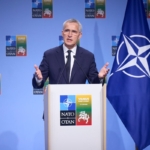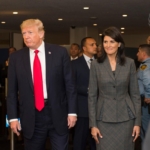The tone escalation in Northeast Asia is alarming the chancelleries of the region and beyond. The fragile equilibrium on which the peace lies in the Korean peninsula is put to the test on both sides. Trump threatened to send a naval “armada”, putting Pyongyang under pressure during the celebrations for the 105th anniversary of the birth of Kim Il-Sung, founder of the country. Kim Jong-Un, on the opposite side, renewed its threats to the United States and its South Korean and Japanese allies, claiming to be ready to use all of its offensive potential in the event of a conflict. The North Korean nuclear dossier, therefore, is again on the top of the agenda, raising the alarm level of the international community.
The nuclear project is for Pyongyang absolutely strategic in terms of detriment of external threats and for this purpose it funds the program with $ 700 million annually, to advance on the technological ground and equip medium- and long-range ballistic vectors on which, one day, install atomic warheads. The six nuclear tests so far conducted and the progressive technical improvements have allowed the regime to strengthen its position in the chain of regional relations and in the confrontation with the great American enemy, with whom, it should be remembered, a peace treaty was never signed after the end of the Korean War in 1951.
It is not possible to verify Pyongyang’s proclamations and no one knows for sure when Kim will be able to rely on the hydrogen bomb or on a ballistic missile capable of reaching the American West Coast. This uncertainty, however, plays in favor of the regime, which shows the muscles without the enemy being able to understand with certainty whether they are made of flesh or fake.
Nuclear rhetoric is an important instrument of control and affirmation also on the domestic front, as it allows Kim to consolidate its authority both in the eyes of the population and the bureaucratic-military establishment that plays a central role in the country. When he succeeded his father in 2011, Kim was almost unknown at home. Therefore, he immediately had to exacerbate his rhetoric to build the image of an authoritative and determined leader, relying on the powerful propaganda machine and the systematic cleanup of internal opponents. Paradigmatic example was the physical elimination of Jang Song-taek, uncle of the young leader who had climbed the military hierarchies during the reign of Kim Jong-il and who, in the first months after the succession, played the role of de facto regent of the Regime.
Jang had also become the principal referent of Beijing, the main, if not unique, North Korean ally. And, on the Chinese model, Jang wanted to bring Pyongyang on the road to economic reforms and greater openness . Jang’s specific weight in the power system and his plan to transform the country, moving away from the dynastic and personalistic model in favor of a more collegial conception inspired by the Beijing example, have been probably the origin of its end. Progressively marginalized by the new leader after 2011, he was arrested in 2013 and killed along with other members of his circle.
This demonstration of strength, while serving as an example to other possible internal opponents, marked the beginning of a new phase of isolation of the country from the rest of the international community. Subsequent nuclear tests and the aggressive rhetoric of Kim have provoked a strong exasperation towards the Pyongyang regime, even in the Chinese ally, traditionally available for patience. After Jang’s execution, Beijing lost its reference man and no longer found trusted interlocutors north of the 38th parallel, losing part of his role as protector and regime controller.
If for a long time North Korea has been a pressure instrument on the international community and a buffered state between Beijing and the Asian allies of the United States, it is now likely to be a risk factor for Chinese interests in the region. North Korean intimidations has had the effect of releasing the arming race in neighboring countries, thus altering the traditional balance in the Pacific and putting Beijing in a situation of unprecedented difficulty. Pyongyang’s defense may therefore be counterproductive for China, which could ultimately opt for pragmatic convergence with the United States, South Korea and Japan.
In 2016, for the first time, China joined the sanctions system against the North Korean government, marking a major breakthrough. Beijing is in fact the first trading partner for Pyongyang and hosts a large number of bank accounts, companies and firms that manage the regime’s legal and illegal activities. In 2017 coal imports from North Korea will drop by about 50%, with estimated economic damage of about $ 700 million, equal to the entire budget for the nuclear research program.
This change of route does not, however, result in a Chinese flattening on American positions. Beijing did not appreciate at all the explicit threats put forth by Trump against North Korea and, at the March bilateral summit in Florida, Chinese President Xi Jinping reiterated the need to find a diplomatic solution and avoid a dangerous escalation in the region. Beijing could not afford to remain a passive spectator in the face of any US military action that would have a direct impact on its national security.
The economic and commercial leverage could allow China to re-enforce its influence on the North Korean military and bureaucratic elites, who base their prosperity on the ability to do business with the powerful neighbor. However, it will be necessary to locate new contact persons in Pyongyang so that it can return to influence the regime’s policy and best manage, in the event of a fall of current leadership, the transition phase. A recaptured influence would also allow China to get a new exchange currency in the relationship with Trump administration, in a delicate historical stage for the relations between the two global giants.
The need to limit the unpredictability of Kim Jong-Un’s regime could be the common ground on which to redefine the boundaries of the relationship between China and the United States. A more assertive role of Beijing towards the regime could therefore be the result of an agreement between the two sides of the Pacific, with a possible marginalization of the role played by Japan and South Korea in determining a new strategy.
Tokyo and Seoul would be on the front line in a possible armed conflict with Pyongyang. If, however, Japan appears ready to support the Trump administration’s muscular approach, Seoul continues to push for the search of peaceful and diplomatic solutions. In the midst of a political crisis that led to the resignation of former President Park, South Korea is likely to find itself without a strong government when crucial decisions are taken, with direct consequences on its national security.
Image: Wikimedia








